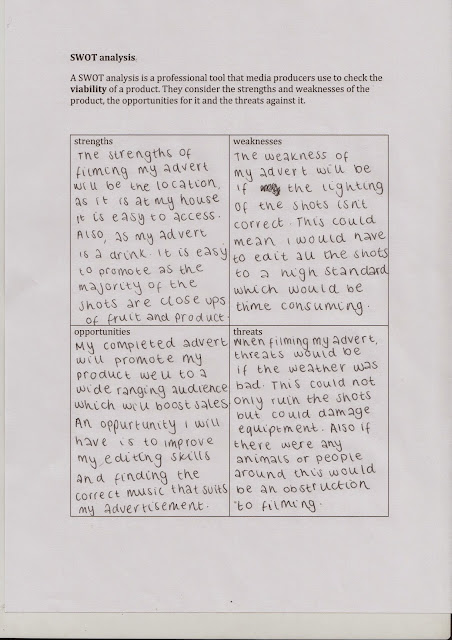Monday, 23 February 2015
Friday, 13 February 2015
Wednesday, 4 February 2015
Advertising Regulations - ASA Report
ASA website
The
Advertising Standards Authority (ASA) gives advertising codes, which
advertisers must follow. The work that the ASA do includes acting on complaints
and to check the media to take action against offensive advertisements. The
purpose of this is to make advertisements responsible.
CAP Code
All advertisers, agencies and media must follow this code.
The Advertising Standards Authority can take steps to remove or have amended
any ads that don’t obey these rules. There are about 35 CAP codes.
Examples of CAP codes
Alcohol is one of the 35 codes. It is
stated that the
rules are designed to protect under 18s and the wider population.
Another
code is competition. It states that the rules about fair and clear about administration
of competitions.
Children are another CAP code and include rules about unsafe
practices and unfair pressure; pester power and sales promotions for children.
Bans & Complaints
So
how have some Christmas ads led to complaints? Most commonly, the ASA
receives complaints about Christmas ads on the grounds of religious
offence. For example, a poster displayed in the run up to Christmas, for
the morning-after pill, which stated “Immaculate contraception? If only” was
banned by the ASA because it considered that using a pun based on a fundamental
Catholic belief was likely to cause serious or widespread offence in the
context of an ad for contraception (Schering Health Care Ltd, 22 December 2004).
It
is not just religious portrayals that can lead to complaints. A TV ad by
the supermarket chain ASDA, which stated “Behind every great Christmas there’s
mum, and behind mum there’s Asda”, drew a large number of complaints that it
was offensive and sexist because it reinforced outdated stereotypes of men and
women in the home. The ASA did not uphold the complaints because it
considered that the ad simply reflected Asda’s view of the Christmas experience
for a significant number of their customers, rather than condoning or
encouraging harmful discriminatory behaviour (Asda Stores Ltd, 30 January 2013).
Not
all references to Christian beliefs or practices are likely to be problematic
though. While a Christmas-themed ad referring to "all our
stupid songs" prompted complaints that it was likely to cause offence because
it mocked carol singing, an element of Christian worship; the ASA noted that
the activity was a part of British Christmas tradition, followed by both
Christians and non-Christians alike, and didn’t breach the Code (Kentucky Fried Chicken (Great Britain) Ltd, 5 March 2014).
An example of an advert that has been banned is the Iron Bru
Advert 2013. The advert was banned, as there were 176 complaints of the ad
being offensive, inappropriate, sexist, demeaning to women and unsuitable for
children to see.
The Burger King
Advert 2010 was banned due to false advertisement. Viewers had noticed that the
burger sold in the Burger King stores were smaller than the one shown in the
advert. ASA went to Burger King and found out that the viewers were correct so
this advert was banned due to it being misleading.
The Paddy Power Advert 2010 was banned due to the fact that it was seen as
offensive to blind people and was seen to encourage animal cruelty.
Why do we need ASA?
I think adverts should be regulated
as if they weren’t people would be able to lie and make false claims. Also
children may see or hear something inappropriate. Some adverts may even cause
offense to different races or cultures etc. Due to this I think that we do need
ASA because when inappropriate adverts are made ASA have the ability to ban
these. If there were no regulations / ASA then people would be free to use
whatever language they want, they would be free to lie and make false claims
and also they could offend anyone.
Subscribe to:
Comments (Atom)










